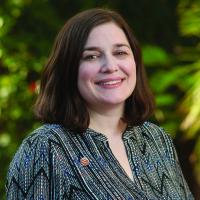August 16, 2018

Janna Cohen-Rosenthal, 38, enjoys long walks in the park, which, as the new executive director of the Franklin Park Coalition (FPC), is probably a good thing.
The Roslindale resident grew up in Baltimore and Ithaca, NY, but has lived in Boston since studying sociology and environmental studies at Brandeis University.
She received an MBA in nonprofit management from the Heller School of Social Policy and has previously served as the climate programs director at Second Nature, a nonprofit working to accelerate climate action, and founded the Campus Sustainability Initiative at her alma mater.
It was while living in Jamaica Plain that she was first introduced to Franklin Park, a place that reminded her of the natural beauty she grew accustomed to in Ithaca. She took some time recently to talk with the Reporter about sustainability, community, and what she has planned for this “gem of the Emerald Necklace.”
Q. How long have you been involved with Franklin Park?
A. I had been a neighbor, living right next to Franklin Park, for many years. We had donated to the non-profit and been involved in the community. So, when I saw this opportunity to be the executive director of the coalition, I just jumped at it. I thought this was a wonderful way to give back and be involved, and to really help advocate for an amazing place.
Q. What do you hope to accomplish as executive director?
A. The organization is undergoing some transition, so my goal for the first year is to strengthen it so it can operate as it has, and going forward we can start thinking about the really exciting big picture. Also, we need to grow our membership. People can become a member by donating. The minimum is $10/year. The more members we have, the stronger our voice is. I’m hoping that people in Dorchester, Roxbury, Mattapan, who all are neighbors to the park, can become FPC members and work together for the park.
Q. How do you feel your work at Second Nature and Brandeis those places will translate to your new position?
A. In those positions I always really tried to take the positive approach. When I was a sustainability coordinator, I always tried to approach it like [being sustainable] wasn’t full of no’s, like “no, you can’t use paper or energy,” but more like, how can we improve people’s lives and also protect our resources while saving money? So even though this is a different topic and I’m not working in energy, I think the same thing applies in knowing that people like to walk through a nice park instead of driving because it’s good for the environment and also improves their lives.
A lot of my work before here was on resilience, which is preparing for and adapting to climate change, not so that we’re all living in bunkers, but so that we have a positive, resilient future. Parks are a really big part of that. They’re where ecological services happen, but also where people can cool off and have shade and make connections while the climate is changing. While climate change isn’t the biggest component of this job at FPC, it’s definitely something that will be incorporated, and the city is actually a leader in this area and they want Franklin Park to be a part.
Q. The park recently received money through a linkage with a development in Winthrop Square. Where would you like to see that money go?
A. It’s up to the members of the community, but I think everyone can agree that there has not been a lot of maintenance. Literally, there are ruins in the park, which is kind of cool but also weird. I just went over to the Overlook ruins, where the fog sculptures are happening. It was one of the only buildings that Olmsted actually designed when he did the park, and there’s nothing there. I’ve heard that it’s really important to the community that we have a permanent home for performance and arts in the park, either if it’s rebuilding on those ruins or something else in that area. And, just making the park more welcoming and easier to get around.
Q. Why do you feel parks like this are important to a community like Dorchester’s?
A. First of all, it has such an interesting history. It’s bordered by Jamaica Plain, Mattapan, Dorchester, and Roxbury, and so it’s always been a kind of meeting place in our city, where people of all different types, throughout history, have been able to use the park. Parks are one of the only places in our cities which are open and free, where everyone is welcome, and, especially nowadays, where there’s a lot of divisiveness and talk about communities not getting along, parks are a wonderful place to invest in the future of our community.
Q. What’s your favorite thing to do there?
A. I have young children and we like to walk through the park and go to the zoo. We’re members of the zoo, which is another nonprofit and important partner. I love going into the wilderness; it’s such a special place. I just started going to the line-dancing event that’s up at Schoolmaster Hill and that was really fun.


